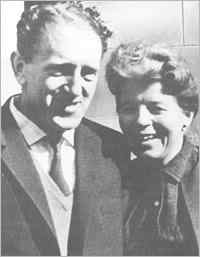Rusty Bernstein
| Lionel "Rusty" Bernstein | |
|---|---|

Lionel and Hilda Bernstein
|
|
| Born |
Lionel Bernstein 20 March 1920 Durban, South Africa |
| Died | 23 June 2002 (aged 82) Cape Town, South Africa |
| Nationality | South African |
| Occupation | architect |
| Known for | Anti-apartheid activism |
Lionel "Rusty" Bernstein (20 March 1920 – 23 June 2002) was a South African anti-apartheid activist and political prisoner.
Bernstein was born in Durban, the youngest of four children of Jewish émigrés from Europe. He was orphaned at eight years old, and brought up by relatives, after which he was sent to finish his education at Hilton College, a private boys’ boarding school.
After matriculating, he returned to Johannesburg where he started work at an architect's office, while studying architecture part-time at the University of the Witwatersrand. After qualifying in 1936, he worked full-time as an architect.
In 1937 he joined the Labour League of Youth. Later, he joined the South African Communist Party where he soon played a leading role. For one year he forsook architecture to work as a full-time Party official and Secretary of the Johannesburg District of the Communist Party. In March 1941, he married Hilda, an immigrant from Britain, whom he had met in the Labour League of Youth.
That year he volunteered for the South African Army and later served as a gunner in North Africa and Italy. He was repatriated and discharged from the army at the beginning of 1946. During the strike of African miners in 1946, he produced the strike bulletin. After the strike both he and his wife were arrested together with others and charged with sedition. They were ultimately convicted of aiding an illegal strike and received suspended sentences.
Over the next quarter century, he wrote extensively for the a number of journals, including Liberation and the South African newspaper The Guardian. He edited Fighting Talk (which became a banned publication), a paper for ex-servicemen. This carried the same message as his other writings; that South Africa was approaching its last chance to make a peaceful transition to democracy. Once he was banned, he continued to write under several pseudonyms.
In 1950, the South African Communist Party (SACP) was banned. All SACP members became subject to various restrictions, including a ban on being published. After this, Bernstein took part with others in forming an underground Communist Party. He was prominent in forming the Congress of Democrats, an organisation for whites that could co-operate with the African National Congress (ANC), which at that time was restricted to black membership only. This Congress Alliance drew in radical trade unions, and many other non-racial political organisations.
...
Wikipedia
